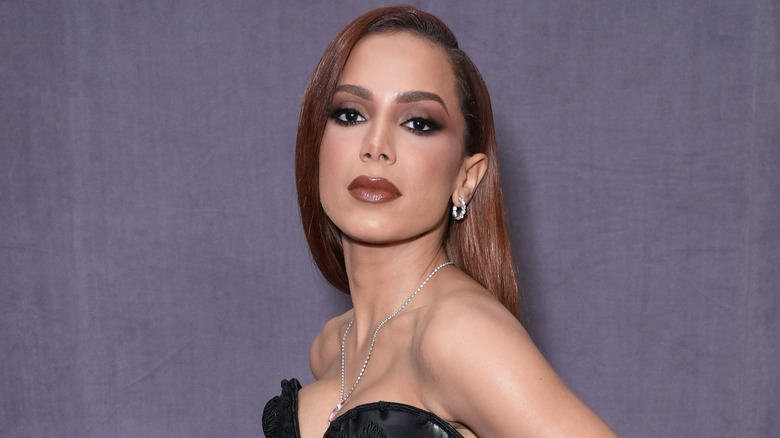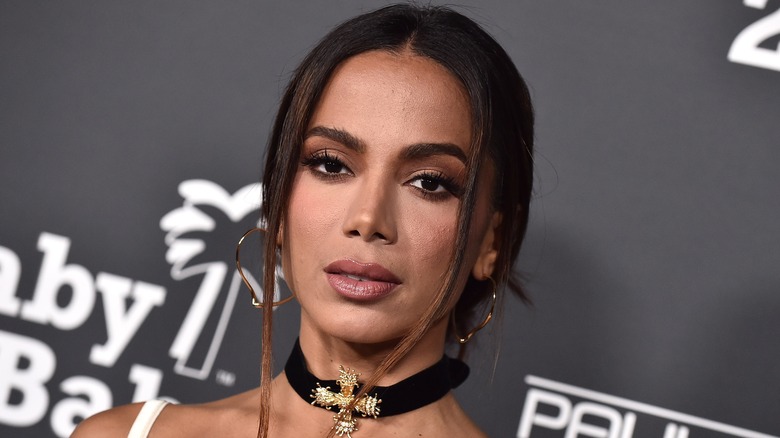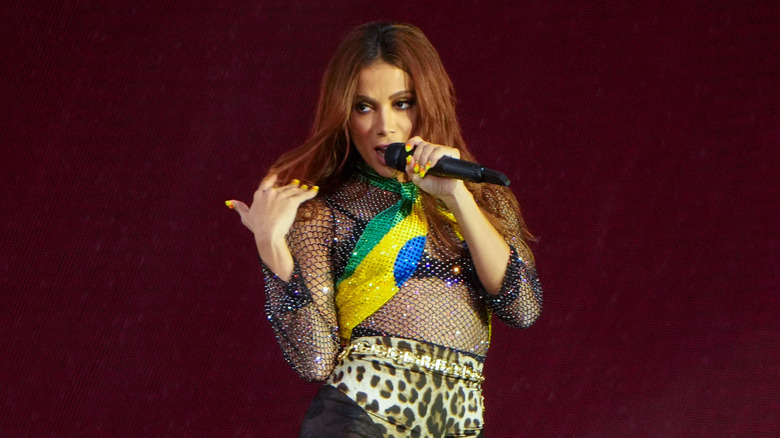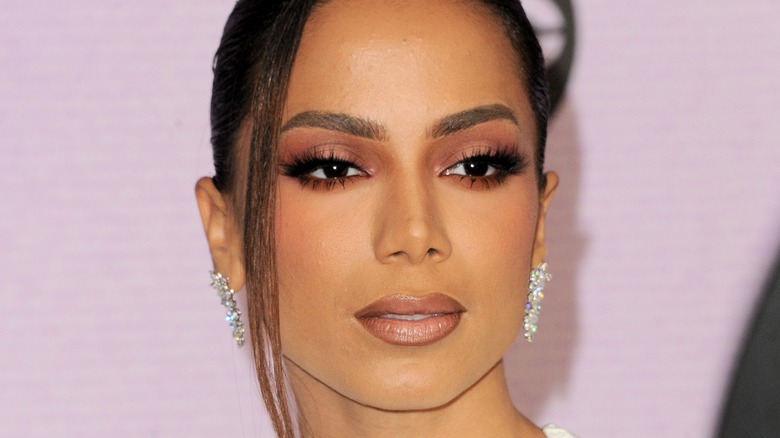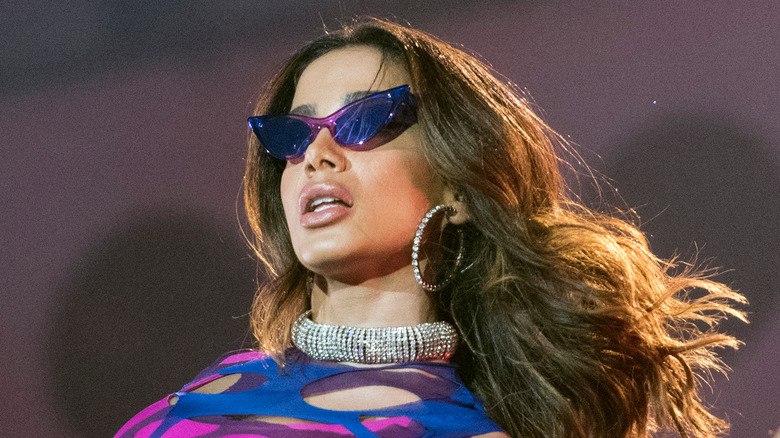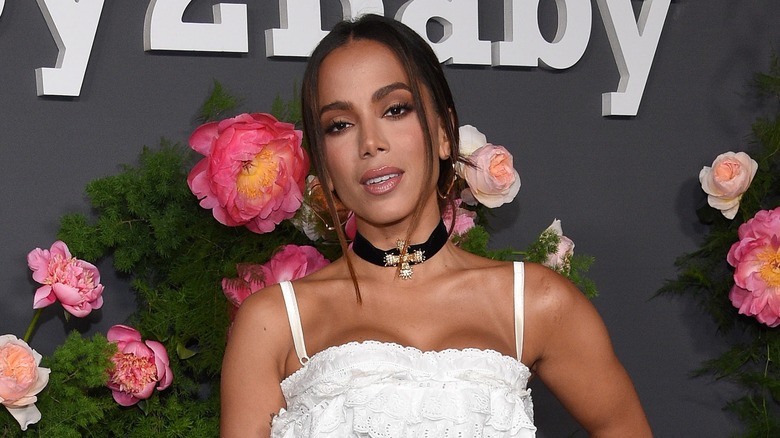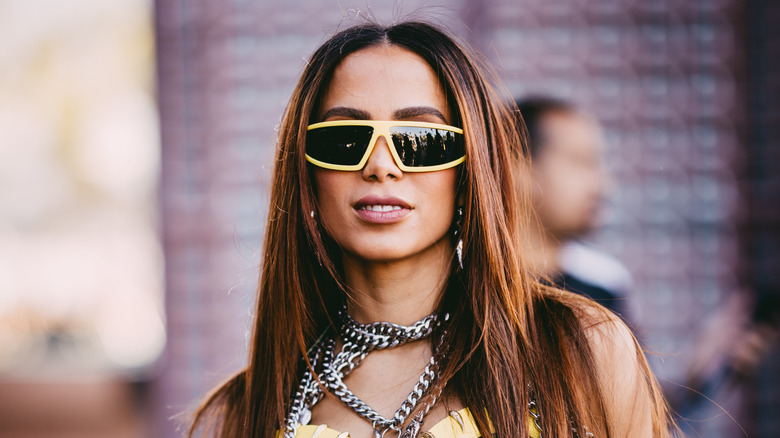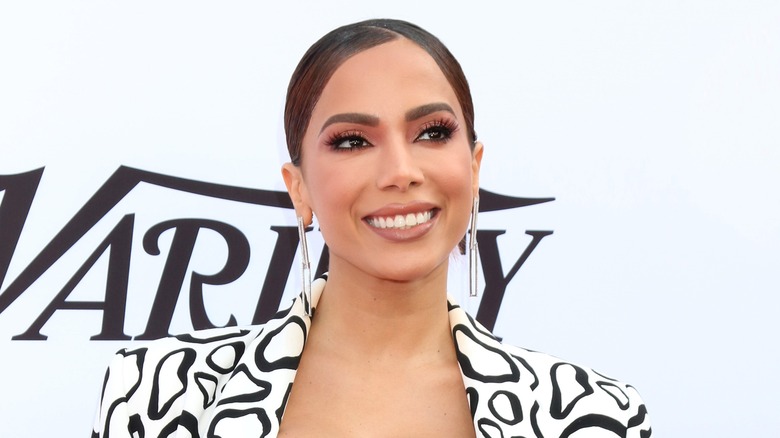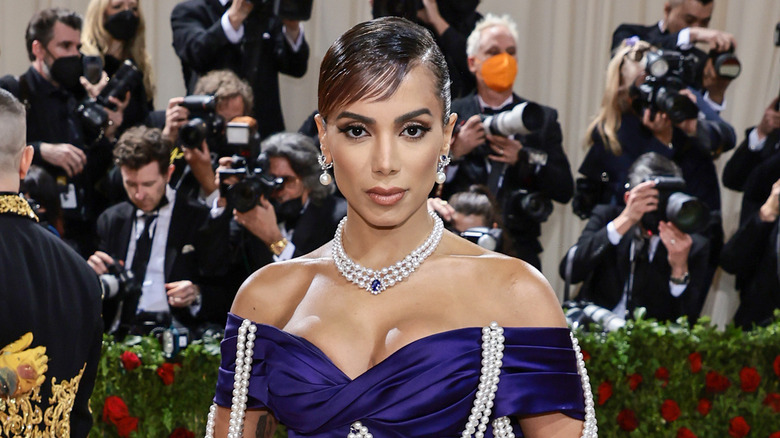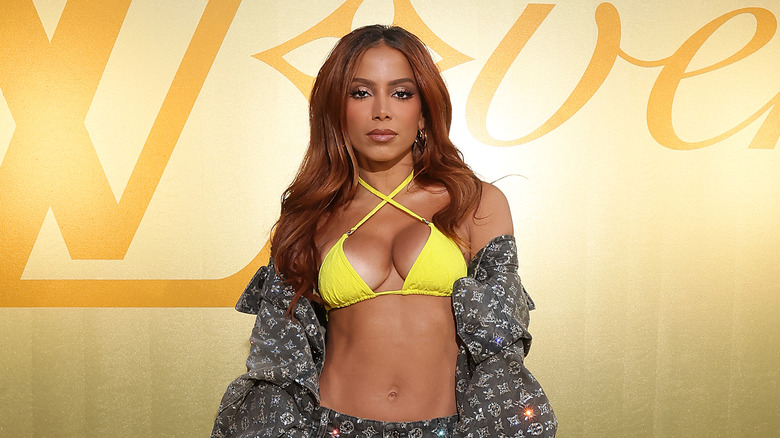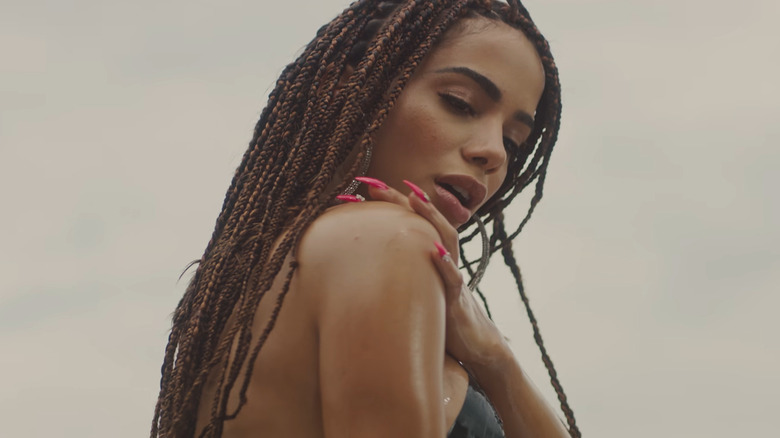The Tragic Truth About Anitta
Her intoxicating dance moves, rhythmic funk beats, and Latin flair have put a spell on us all. We're talking about Anitta — obviously – and if you don't know her, she's on a mission to change that. The Brazilian beauty (real name Larissa de Macedo Machado), is a global superstar, setting records in the music industry that no artist in South America has ever achieved. Just over a decade ago, the singer was singing into a deodorant can, with dreams of Met galas and VMA stages a distant reality. The cheeky clip landed her a record deal, however, and "The Girl From Rio" was born.
The singer has incorporated funk music into mainstream pop culture in her own way. She's shattered the stereotypes associated with the genre, which was born out of the poorer neighborhoods in Brazil, or "favelas." Despite people associating the music with gang culture and violence, Anitta says the people of Brazil are simply singing their truth. "If you want to change funk or what is being talked about or the way it enters society, then you have to change the root, the educational issues, the issues that make up funk," she admitted to BBC Brasil.
Anitta embraces her humble roots, having grown up in the favelas of Rio de Janeiro herself. Her odds of stardom were slim to none, but she clawed her way to the top to overcome every prejudice stacked against her. The reality of the artist's rags-to-riches story is grittier than many realize, however, and we're breaking down some tragic details about Anitta.
Anitta grew up in the slums of Rio de Janeiro
It's hard to imagine that the same artist who glided onto Coachella's stage on a motorcycle, walked the red carpet at the Met Gala, and rocked the VMA stage is the same artist who got her start in Rio de Janeiro's roughest neighborhoods. But the Rio de Janeiro the rest of the world thinks of is not the reality Anitta grew up in. The sandy beaches that line the strip of Copacabana were far from Anitta's childhood home in Honório Gurgel, a favela in the north zone of the Brazilian state.
The artist grew up in a small neighborhood, sharing a room with her mother and brother to enjoy the only room in her home with air conditioning. "Growing up, my father would say, 'We're poor, you can't study the arts,'" she told The New York Times. The singer grew up around violence and crime, telling i-D: "People who don't have the choice to live in the city they go to the Favela. It's more dangerous. It's like a war every day in your city."
Anitta eventually dropped out of college to pursue a career in music, getting her start by playing at secret illegal parties in the favelas. "I started bothering everyone and asking if I could sing at their events, the 'proibidas,'" she said, referring to the Brazilian word for prohibited. Eventually, after years of grinding in the outskirts of Rio de Janeiro, Anitta launched her career in 2013 with the track "Show Das Poderosas."
The singer was sexually assaulted as a teen
Anitta is known to millions around the world by her stage name, but her fans may not know the true origin of her alter-ego. The "Funk Rave" singer opened up about adopting a new persona in her Netflix documentary "Anitta: Made In Honorio," (per Harper's Bazaar) detailing that "Anitta" was born out of a darker time in her life.
The singer revealed that she was sexually assaulted when she was just a teenager. Years later, she decided to tell the truth about the incident after a Brazilian journalist got wind of the information. "I felt so mad that this guy felt that he knew something about me that could hurt me," she explained.
Out of the pain, "Anitta" was born. "She was born out of my desire and need to be a brave woman," she admitted. "One who no one could ever harm, who no one could ever bring to tears, whose feelings no one could ever hurt, who could find a way out of any situation ... that's how I created that character." She went on to add that she "just wanted this woman that nobody could f**k with. Because in the moment, you still blame yourself; you think that if you behaved differently, that wouldn't happen to you." Anitta told The New York Times that she was inspired by the name after watching a lead character in the Brazilian television show "Presença de Anita," saying, "She could be romantic, sensual, intelligent and crazy all at once."
If you or anyone you know has been a victim of sexual assault, help is available. Visit the Rape, Abuse & Incest National Network website or contact RAINN's National Helpline at 1-800-656-HOPE (4673).
Anitta had to be rude to be respected as a female artist
Anitta has faced a fair share of sexism on her journey to achieve global recognition. While her hypnotizing dance moves and sultry looks command attention, she refuses to get ahead in the industry based on anything but her talent. On "The Kelly Clarkson Show," the "Vai Malandra" artist admitted some sad realities about the music industry, revealing that she's denied job opportunities because music executives were seeking sexual favors.
"In the beginning, I used to get frustrated and go home and cry. Now I just learned how to get rude and mad and aggressive," the singer revealed. "I just stand up and I'm like 'You're all dumb,' I don't care. If you're going to treat me [badly], I'm going to treat you right back, I learned it."
When it comes to sexuality, Anitta is the first to speak out against double standards. The "Versions of Me" singer took to Instagram to clap back at Reggaeton singer Arcangel, a singer she's collaborated with in the past. "You want to be respected as a woman blah blah blah! But you spend your time showing your a** on social media for likes,"Arcangel wrote on his Instagram Story the day after International Women's Day in 2021 (per Billboard). Anitta responded by posting a bikini photo, writing: "You use women's butts in your videos and sing explicit lyrics to get views but at the same time, you say that women who show their own butts on social media don't deserve respect? I'm confused."
The star was told to minimize her accent
While most Americans can't even speak two languages, Anitta speaks five. The singer joked on an episode of "This Is Paris" that she "used to change boyfriends for whatever language I wanted to learn," but in reality, there was a bit of hard work that went into her mastering five languages. Aside from her native Portuguese, Anitta speaks English, Spanish, French, and Italian.
In an interview with The New York Times, Anitta admitted that she worked with a speech therapist for years to help master singing in other languages. "I realized that if I spoke slower in meetings or with an accent, people would respect me less," the "Love Me" singer explained. Anitta revealed that she re-recorded tracks several times in an effort to master her English.
Anitta has collaborated with several legendary artists in Spanish, including J Balvin and Maluma. While she's made a name for herself on the Latin charts, she's also worked with Italian rapper Fred De Palma on his track "Paloma" and hit French artist Dadju on the track "Mon Soleil." In an interview for NPR, she admitted: "You need to give up all the things that you have in Brazil to go to another market and learn Spanish, then learn English — I did also in Italian and French. So it's a completely different world."
She hid her sexuality for years
Anitta came out as bisexual in her 2018 Netflix documentary "Vai, Anitta" after years of disguising her sexual identity. "The reason why I opened about it is because here in Brazil, there was a lot of criticism and a lot of taboos over that," she told InStyle, recalling an instance where she kissed a girl at a party and her team rushed to delete the evidence. "It was a whole job for my security to go there, ask [people] to delete the picture, because people would say I had kissed the girl, and I would lose the brand deals and everything."
If there's one thing Anitta is not — it's a liar. While her character Anitta may be an alter-ego, she felt the need to be honest about her sexuality instead of hiding it to promote her career. Despite her honesty, the singer has still been criticized for her decision to come out. "Some people say I am a 'fake bi,' because I never dated a girl like a long-term relationship. But come on, even my relationships with guys cannot last more than three months," she joked.
To the LGBTQ+ community, Anitta is an icon, collaborating with famous Brazilian drag queens like Gloria Groove and Pablo Vittar. Despite her support for all walks of life and love, the singer simplified it by telling the Los Angeles Times: "I don't just fight for women or LGBT representation," she adds. "I fight for us all to have a sane environment. We at least deserve that."
Anitta struggled with her opposing identities
Anitta may be the sexy, confident powerhouse artist that millions of fans know her to be, but she's revealed that she has a softer side she doesn't always present to the world. Underneath all the glitz and glam, Larissa — the girl from the favela who became a star — still exists. "Larissa is very private, very relaxed, very low key and very quiet. Anitta is the opposite: outspoken, exposing myself," the artist told People. "I think it's two completely different people and I used to struggle with that." At times, the Grammy-nominated artist felt at war with herself.
Nowadays, the singer communicates what she wants to the world. Her evolving personality became the backdrop for her album "Versions of Me," and she admitted that even her friends don't know who they're going to encounter: Larissa or Anitta. "Whenever I wake up, they wait 15 minutes to see who is in charge," the artist joked on "The Kelly Clarkson Show."
While Anitta may take the stage, Larissa is behind the scenes with an agenda. In an interview with InStyle, she admitted that she's used her alter-ego to speak on taboo issues. Her album cover for "Versions of Me" was designed based on herself at various stages in life after several plastic surgeries. "[My fans are] looking online and they're thinking that what they see online is the truth," she said, adding, "And I think that can be dangerous for the new generation. So, I like to be honest."
Her cancer scare led to a long hospital stay
Anitta's single "Used to Be a Hoe" may be a tongue-in-cheek way to make light of her promiscuous past, but the singer revealed that the track was born out of a difficult time in her life. It's from her three-song collection "Funk Generation: A Favela Love Story," with lyrics like: "I used to be a hoe, but now I ain't no more / Been swimming through the water, now I'm back to shore / I look at who I did and I'm like, 'Oh, my Lord.'"
In an interview with InStyle, Anitta revealed that the song was made to reflect back on a more reckless time in her life. At the end of 2022, the singer found herself facing serious health problems that shifted her perspective on her past. "I had problems in my lungs, I had a cancer [scare]. I spent months in the hospital. Nobody could figure out what I had," she mentioned, adding that she eventually sought the help of a shaman. "I came back completely changed," she said, admitting that she was miraculously healed after undergoing a spiritual journey.
While Anitta may say she "used to be a hoe," the singer doesn't need a man to tie her down. "Girls don't need men for sh**. We got vibrators, we got friends. We got gay friends, which is way better than any other f**king husband. Trust me," she told Nylon.
She suffered from endometriosis for years before being diagnosed
Anitta opened up about her diagnosis of endometriosis in 2022, revealing that she suffered for nearly a decade before finding out what was causing her pain. In a series of tweets, the Brazilian artist revealed she had tried everything to alleviate severe pain after intercourse with no solution. After several misdiagnoses, Anitta finally discovered the problem.
"I went to stay with my father at the hospital," the singer wrote, adding that her father was receiving treatment at the time. She admitted that she "told my dear friend angel doctor, who runs everything there, that I'm frequently dying of pain," and she was sent for an MRI. After getting the results, the "Gimme Your Number" singer was told she didn't have recurrent cystitis, as she originally thought. According to the Mayo Clinic, cystitis occurs when there is an inflammation of the bladder caused by bacteria. Instead, Anitta was diagnosed with endometriosis, a condition that occurs when the endometrial tissue grows outside of the uterus.
Anitta claimed she dealt with criticism in the media and articles that allegedly read: "How to avoid Anitta's UTI." But Anitta clapped back about the harmful assumptions about her, writing: "When I read these stories I thought 'did these people examine me without me knowing?" In a final plea on X, she wrote: "Here is my appeal for more information for women. More access, more general interest in taking care of the female body so that we can be free and be able to take care of ourselves."
The singer harshly criticized Warner Music Group
Anitta had a lot to say about the termination of her contract with Warner Music Group, and it wasn't exactly nice. The "Downtown" singer spent over a decade with the label, producing her LP "Versions Of Me," collaborating with the likes of Snoop Dogg and Cardi B. She was also the first Brazilian artist to earn a No. 1 hit on the Billboard Global Excl. U.S. chart with her hit track "Envolver."
Despite her successes, there was a lot of tension brewing under the surface. Anitta parted ways with the label in 2023 and took to X to warn her followers about the importance of signing legal documents. "If there was a fine to pay, I would have already auctioned off my organs, no matter how expensive it was to get out. But unfortunately, there isn't," she wrote of leaving her contract. "When you're young and still don't know a lot, you need to pay close attention to the things you sign ... if you don't, you could spend a lifetime paying for the mistake," she continued. In an Instagram Live (via Stereo Gum), the singer claimed various issues led to her departure, including the label refusing to film a music video if Anitta didn't meet a certain number of streams.
Anitta and Warner Music released a statement at the time, saying: "After eleven years of successful partnership, we've agreed to go our separate ways. Anitta would like to thank the Warner Music team for all their support."
Accusations of cultural appropriation
Anitta's 2017 track "Vai Malandra" gave viewers an inside look at the grittiness of the Brazilian favelas. From showcasing motorcycles climbing the winding roads, chickens in the street, and twerking in a bikini made of nothing but black tape — Anitta wasn't afraid to go back to her roots. While many celebrated the singer's efforts to focus on the poorer, heavily Black neighborhoods of Rio de Janeiro, others saw it as cultural appropriation.
"Anitta uses blackness when it suits her," wrote a columnist in a special for Marie Claire in response to the video. It isn't the first time she's been called out, either. The singer received backlash in 2017 for posing with braided hair in Salvador, considered "Brazil's most African city." But despite the allegations, Anitta believes that cultural appropriation is hard to exist in her South American country where a melting pot of Blacks and mixed-race individuals make up the population. "Nobody is totally white in Brazil," Anitta told the Folha de S Paulo newspaper (via The Guardian). She herself comes from a mixed race family, telling Interview magazine: "My dad is Black. My mom is Latin."
Despite the haters, Anitta received massive praise from those who saw her culture shine throughout the clip. "The favela is very rich in music, in colour, in life. It's good that the world knows this –- that it knows we are not just bleeding bodies, gunfights and tears," Bruna Aguiar, a former student from the Acari favela in Rio, told The Guardian.
Anitta risked everything she knew for an international career
While Anitta is a household name in Brazil, she won't stop until she achieves global domination. In an interview with Billboard, the artist admitted that she had to miss out on several touring opportunities and brand deals in her home country in order to focus on tackling the United States market.
Her family had doubts, including her brother who said, "'Why? You will need to start from the bottom and do the sh** you were doing six years ago. You don't even have the energy anymore.'" Anitta stayed true to her goals, however, despite the difficult road ahead. "And I told him that's what I wanted, although I was really scared," she explained. "It meant I would abandon everything I had done. I knew that if I failed, everyone in my country would laugh at me. That's what happens to everyone who tries and fails. I didn't want to become a joke. I wanted it to happen for real."
Anitta was told by several music executives that her dreams were impossible, as it was something that had never been done. A handful of Brazilian artists landed hits on the top Latin charts, but to break into the international market was a different ballgame. Nearly a decade after her first hit in Brazil, Anitta became the first Brazilian to chart a No. 1 hit with her song "Envolver" in 2022 and the first Brazilian to take home a VMA for the same track. In Anitta's words, "There's no 'impossible' for me."

